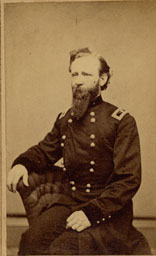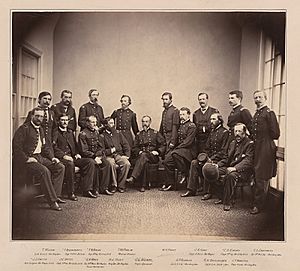Edward L. Campbell facts for kids
Quick facts for kids
Edward Livingston Campbell
|
|
|---|---|
 |
|
| Born | February 2, 1833 Belvidere, New Jersey, U.S. |
| Died | December 27, 1913 (aged 80) Trinidad, Colorado, U.S. |
| Buried |
Masonic Cemetery, Trinidad, Colorado, United States
|
| Allegiance | |
| Branch | |
| Years of service | 1861–1865 |
| Rank | |
| Commands held | 4th New Jersey Infantry Regiment |
| Battles/wars | American Civil War |
| Alma mater | Lafayette College |
Edward Livingston Campbell was an American soldier. He became a high-ranking officer, a Brevet Brigadier General. He led troops in important battles during the American Civil War. He commanded the 15th New Jersey Infantry Regiment and the 4th New Jersey Infantry Regiment. These units fought in several battles during the Shenandoah Valley Campaign.
Fighting in the Civil War
When the American Civil War began in 1861, Edward Campbell joined the Union Army. He helped form the 3rd New Jersey Infantry Regiment. He became a captain and led his company in the First Battle of Bull Run. This was one of the first major battles of the war. Later, his regiment joined the First New Jersey Brigade.
In August 1862, Campbell moved to the 15th New Jersey Infantry Regiment. He became a Lieutenant Colonel, a high-ranking officer. He was injured during the Battle of Antietam, a very bloody battle.
Leading the Brigade
In September 1864, Campbell became the main commander of the First New Jersey Brigade. He led his troops through several key battles. These included the Third Battle of Winchester, the Battle of Fisher's Hill, and the Battle of Cedar Creek. He was wounded again during the Battle of Cedar Creek.
Near the end of the war, Campbell worked for George Meade. Meade was a very important Union general. Campbell served as an Acting Judge Advocate on Meade's staff. This role involved legal matters for the army.
On October 19, 1864, he was promoted to colonel. On April 9, 1865, he was given the honorary rank of brigadier general. This was for his "gallant and meritorious services." This means he showed great bravery and did excellent work. His actions helped lead to the fall of Richmond, Virginia. Richmond was the capital of the Confederate States. His bravery also helped lead to the surrender of General Robert E. Lee's army.
After this, Campbell was given command of the 4th New Jersey Infantry Regiment. He was honorably released from service on July 9, 1865.
Life After the War
After the war ended, Edward Campbell first went back to Trenton, New Jersey. Later, he moved to Trinidad, Colorado. He passed away on December 27, 1913. He was buried at the Masonic Cemetery in Trinidad.
 | Delilah Pierce |
 | Gordon Parks |
 | Augusta Savage |
 | Charles Ethan Porter |


